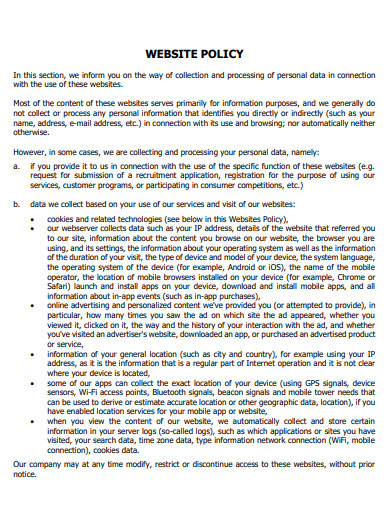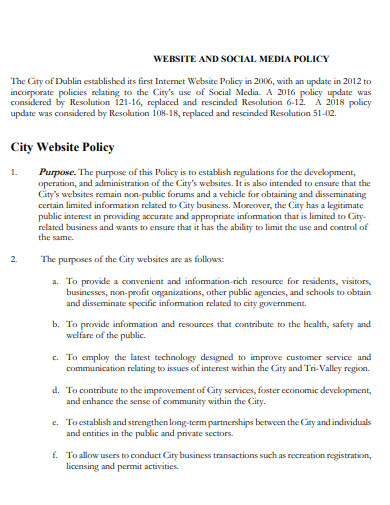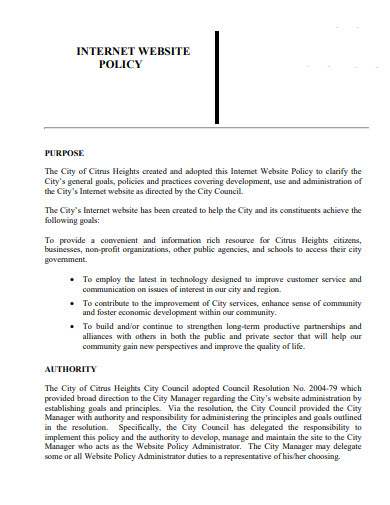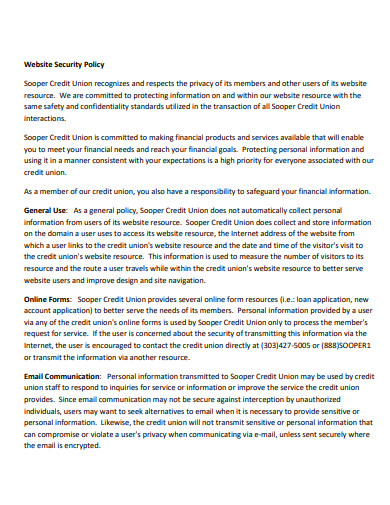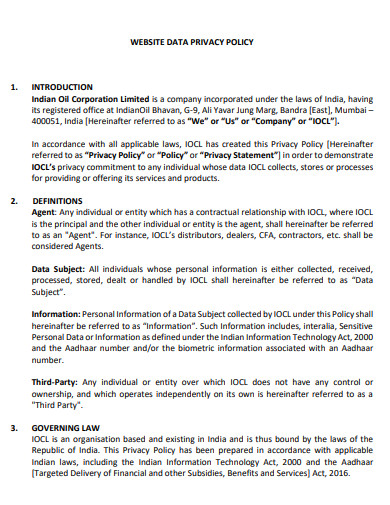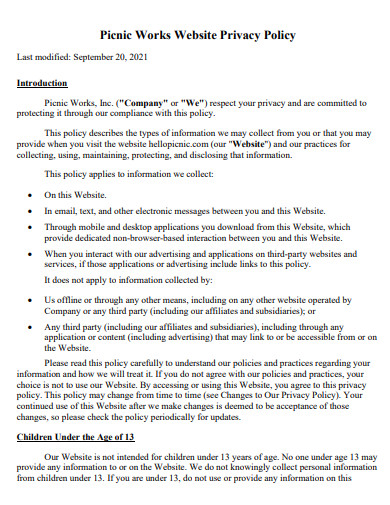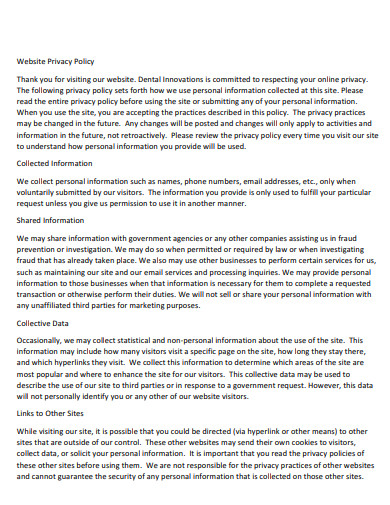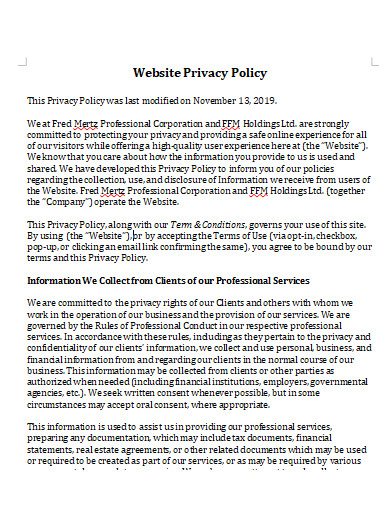Most of your consumers aren’t out on the street giving away their credit card numbers and addresses to random strangers. In truth, most people nowadays would not offer their email addresses to persons they don’t know. People must feel protected before they will spend money, leave comments, join your mailing list, or take any other action you want them to take when they visit your website. Safety breeds trust, which breeds loyalty, which breeds purchases and shares. Using the correct legal wording will help you gain the trust of your visitors. It will also safeguard your earnings. Some of the legalese is mandated by law.
10+ Website Policy Samples
A privacy policy is a written component of your website that explains what data you gather from users and customers. It also teaches how to make advantage of it. So, how do you go about building one for your small business’s website? But, before you design your own privacy policy, think about this. You might want to have a peek at one before developing your own. A few crucial components are included in most privacy policies. These include data gathering procedures as well as how that data is shared and used. They also contain information on how users can manage how their data is used. They also include cybersecurity and cookie policies.
1. Website Privacy Policy
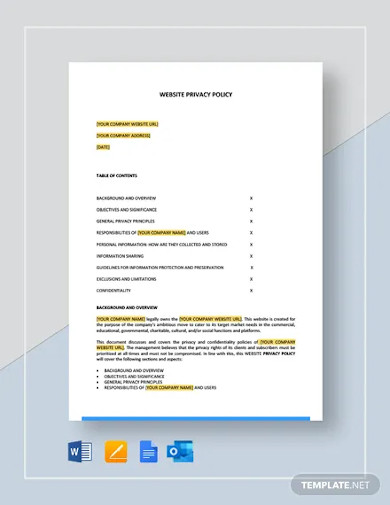
2. Restaurant Website Privacy Policy
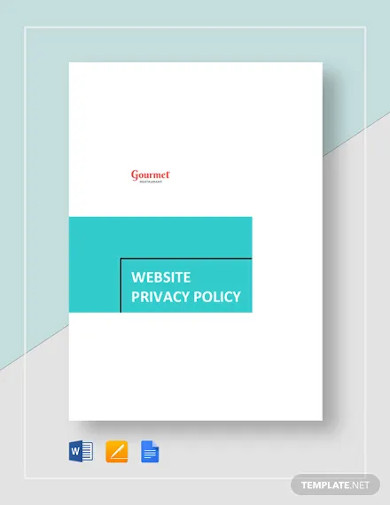
3. Endorsement Disclaimer Policy for Website
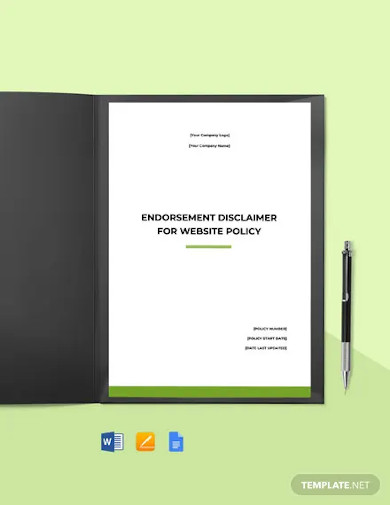
4. Website Policy
5. Website and Social Media Policy
6. Internet Website Policy
7. Website Security Policy
8. Website Data Privacy Policy
9. Picnic Works Website Privacy Policy
10. Sample Website Privacy Policy
11. Website Privacy Policy Example
Five Essential Components That Your Website Requires
Privacy Policy
Your Privacy Policy is a tool that aids in the development of trust among your site’s viewers. It informs your customers about the personal data you collect and how you use it. It’s one of those things that the law requires. Your Privacy Policy’s content is determined by the applicable law and, to some point, the nature of your website. A Privacy Policy is required for two key reasons. The way you communicate with visitors to your website is governed by federal law and, in some situations, state law. The second reason your site requires a privacy policy is that it aids in the development of client trust.
Terms and conditions
Terms and Conditions are an agreement you enter into with your website’s visitors. They specify the actions you anticipate from your guests as well as what you anticipate from them. Terms & Conditions that are well-written will help you restrict your overall legal liability, preserve your valuable intellectual property, and collect payments on schedule. Any issues originating from the usage of, or sales from, your site will most likely be more complex and costly if you don’t have Terms and Conditions.
Refund policy
Even though a Refund Policy is most likely included in your Terms and Conditions, it’s such a vital topic that we’ll talk about it individually. It’s a good idea to include your refund policy in your Terms and Conditions, as well as post it individually so that people can quickly locate it. Refunds are a common occurrence in the world of digital commerce. As a result, having a clear policy that is visible to your visitors is beneficial. The most crucial thing is that you state your refund policy clearly. It will help you avoid headaches and perhaps legal problems.
Comment policy
Although your Comment Policy is most likely included in your Terms and Conditions, it may be essential enough to be listed separately on your website. This policy explains how you deal with comments to all of your visitors. To put it plainly, You have the ability to control your comments as long as you do it consistently and without breaking any anti-discrimination legislation. Yes, you have the ability to discriminate as a business owner. You could be sued if you don’t have a clear, consistent Comment Policy that explains when, why, and how you delete comments.
Copyright notice
Your Copyright Notice informs your visitors that your work is lawfully yours and that they do not even have authorization to use it. Although not essential, a Copyright Notice is an excellent approach to keep visitors from “borrowing” your content. In fact, prominently posting a Copyright Notice and a broad “Here’s how you may or may not use my stuff” policy on your website will get you a huge amount of time, money, and pain in the long run.
FAQs
Do I need a privacy policy?
Many regulations require you to provide a privacy policy on your site that describes your data-handling procedures if you gather personal information from visitors.
Can I copy a privacy policy?
No, you should not take someone else’s privacy policy and pass it off as your own. To be legally sound, privacy rules must be tailored to your website’s data-handling methods. Furthermore, replicating the privacy policy of another website could result in charges of intellectual property theft.
If you want to see more samples and formats, check out some website policy samples and templates provided in the article for your reference.
Related Posts
FREE 10+ Plagiarism/Cheating Policy Samples in MS Word | PDF
FREE 50+ Policy Approval Samples in PDF | MS Word
FREE 50+ Planning Policy Samples in MS Word | Google Docs | Pages | PDF
FREE 10+ Related Personnel Policy Samples in MS Word | PDF
FREE 10+ Suspension And Expulsion Policy Samples in MS Word | PDF
FREE 10+ Uniform Complaint Policy and Procedure Samples in PDF
FREE 10+ Bullying Policy Samples in MS Word | PDF
FREE 10+ Fiscal Control Policy Samples & Templates in MS Word | PDF
FREE 10+ Cooperative Policy Samples & Templates in MS Word | PDF
FREE 10+ Disenrollment Policy Samples in MS Word | PDF
FREE 10+ Donation Policy Samples & Templates in MS Word | PDF
FREE 10+ Homework Policy Samples & Templates in MS Word | Pages | PDF
FREE 10+ IT and Software Policy Samples in PDF | MS Word | Pages | Google Docs
FREE 50+ Policy Samples in PDF | MS Word
FREE 50+ Membership Policy Samples in PDF

